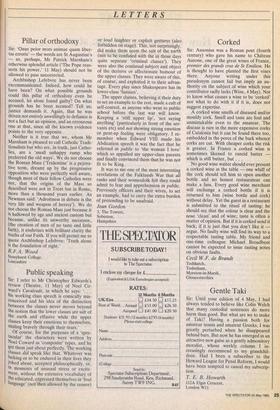Public speaking
Sir: I refer to Mr Christopher Edwards's review (Theatre, 11 May) of Noel Co-
ward's Cavalcade, in which he says: . . his working class speech is comically mis- conceived and his idea of the distinction between the classes never moves beyond the notion that the lower classes are salt of the earth and effusive while the upper classes keep their emotions to themselves, smiling bravely through their tears.'
Of course, for the purposes of a `spec- tacular' the characters were written by Noel Coward as `composite' types, and he got them just about perfectly. The working classes did speak like that. Whatever was lacking or to be endured in their lives they Joked about, accepted philosophically, or, lo moments of unusual stress or excite- ment, without the extensive vocabulary of the educated, expressed themselves in 'foul language' (not then allowed by the censor) or loud laughter or explicit gestures (also forbidden on stage). This, not surprisingly, did make them seem the salt of the earth (not to be confused with the in those days quite separate 'criminal classes'). They were also the continual subject and object of the derisive or affectionate humour of the upper classes. They were aware of this, of course, and exploited it to their advan- tage. Every play since Shakespeare has its lower-class `funnies'.
The upper classes, believing it their duty to set an example to the rest, made a cult of self-control, as anyone who went to public school before the last war will know. Keeping a `stiff upper lip', `not saying anything' (particularly in front of the ser- vants etc) and not showing strong emotion or pent-up feeling were obligatory. I re- member when Edward VIII made his Abdication speech it was the fact that he referred in public to `the woman I love' which so appalled my upper-class parents and finally convinced them that he was not fit to be King.
It was to me one of the most interesting revelations of the Falklands War that all ranks and their womenfolk felt they could admit to fear and apprehension in public. Previously officers and their wives, to set an example, had to carry the extra burden of pretending to be unafraid.
Jean Gordon
3, The Towers, Soberton, Hampshire


















































 Previous page
Previous page